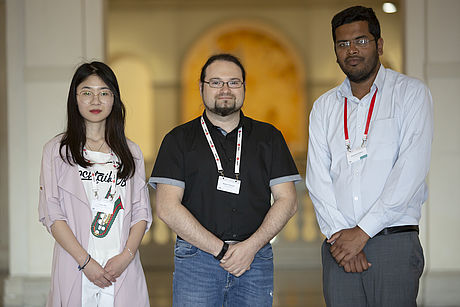Student Travel Grants
Student Travel Grants
SIGHPC is generously sponsoring travel grants for four undergraduate or graduate students to attend PASC19. Two applicants traveling from within Europe and two applicants traveling from another continent will be selected. The students traveling from within Europe will be awarded a maximum grant of $600, and a maximum allowance of $1200 will be given to the selected students traveling from other continents. Moreover, PASC19 will cover the corresponding registration fee for the selected students.
SIGHPC and PASC19 encourage students to submit a contribution to PASC19; however, this is not a requirement of the award.
Applications are due by February 24, 2019, with notification provided by March 11, 2019.
To apply, you must provide the following:
- personal information
- basic budget
- statement of why you wish to attend PASC19 and what benefits you can gain from participating
- letter of support from your advisor or head of department (referencing any institutional support or recognition that will be provided)
Please click here to access the application form.
To apply, email your completed application form and letter of support (in PDF format) to info@pasc-conference.org and indicate "PASC19 Student Travel Grant" as a subject line.
Selected students will be assigned a mentor for PASC19 who will help them get the most out of the conference by suggesting relevant program sessions and introducing them to experts in their research field.
Some impressions from the PASC19 Student Travel Grant recipients
Nicolas Salamin (University of Lausanne) with Anton Artemov and Laura Morgenstern.
PASC19 turned out to be the ideal environment for presenting and discussing first results of my dissertation project regarding task parallelism on GPUs. While researchers from my domain provided me with well-conceived feedback and questions, I also got in touch with scientists from other domains such as astrophysics, high-energy physics and climate modeling, who are aiming to solve similar problems with diverse approaches. Thanks to the interdisciplinary character of PASC, I returned from the conference full of ideas and suggestions for my future work and career. Hence, I highly encourage students to take this valuable chance and apply for upcoming SIGHPC Student Travel Grants to attend PASC. (Laura Morgenstern)
After six years of growth and development, the PASC Conference has become one of the most important gatherings for high-performance computing researchers from all over the world to exchange academic knowledge. As an undergraduate student who has just started in high-performance computing, I was very honored to receive a Student Travel Grant for PASC19 – enabling me to deepen my understanding and study of HPC. I participated in the conference mainly as a “learner”, attending paper presentations and poster sessions from many top researchers in HPC and machine learning. It benefited me a lot – confirming my future learning goals and laying solid foundations for my future studies.
My mentor, Dr. Ruben Cabezon, a postdoc at the University of Basel, introduced me to many leading researchers during the conference, including Professor Olaf Schenk from the Università della Svizzera italiana, with whom I had a very pleasant and productive conversation. I will always remember this wonderful experience in Zurich and wish the PASC conference all the best. (Yuyao Niu)
PASC19 was excellent in many respects.
One of the most intriguing aspect of the conference was to be able to communicate directly with people in HPC who deal in actions rather than mere ideas. I remember, Dr. Cabezon (University of Basel), my mentor, introduced me to a number of colleagues from Oak Ridge National Lab. On one of these interactions, I exchanged few ideas with scientists from ORNL ... and few emails and phone calls later, we are planning to embark on certain highly interdisciplinary quantum projects, this December, which, if successful, shall have a profound impact on virtually all fields of science and engineering.
There were a lot of interesting talks, so much to learn and absorb. The presentations and posters were the living proof of ideas in action ... If we indeed wish to create a sustainable future, we have to put even the whimsical ideas into action; and we have to be ambitious while doing so... ambitious in the sense that our ideas can change the world.
I consider myself as 25% mathematician, 25% engineer, 25% computer scientist, and 25% poet. PASC19, held in the heart of Switzerland, was a blend of all. It had something for mathematicians, something for engineers, something for computer scientists, and something for dreamers and
poets. (Shashank Jaiswal)





